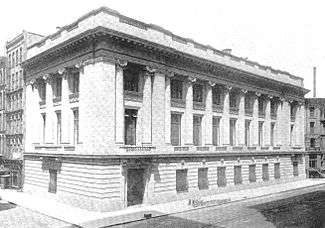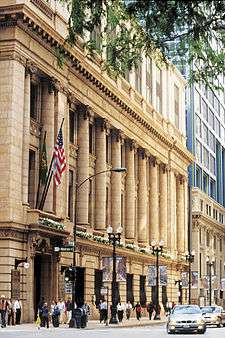Northern Trust
 | |
| Public | |
| Traded as |
NASDAQ: NTRS S&P 500 Component |
| Industry | Financial services |
| Founded | 1889 |
| Founder | Byron Laflin Smith |
| Headquarters | Chicago, Illinois, U.S. |
Key people |
Frederick H. Waddell (President) |
| Products |
Private banking Investment management Wealth management |
| Revenue |
|
|
| |
|
| |
| AUM |
|
| Total assets |
|
| Total equity |
|
Number of employees | 14,100 (December 2011)[2] |
| Website |
www |
The Northern Trust Corporation is an American international financial services company headquartered in Chicago, Illinois. It provides investment management, asset and fund administration, fiduciary and banking services through a network of 85 offices in 18 U.S. states and 20 international offices in North America, Europe and the Asia-Pacific region. As of June 30, 2014, Northern Trust Corporation had $106 billion in banking assets, $6.0 trillion in assets under custody and $924.4 billion in assets under management. They are regulated by the Federal Reserve. In March 2010, Forbes magazine ranked Northern Trust as the world's most admired company in the "Superregional Banks" category.[4]
History
Northern Trust was founded in 1889 by Byron Laflin Smith in a one-room office in the Rookery Building in Chicago's Loop, with a focus on providing trust and banking services for the city's prosperous citizens.[5] Smith provided 40% of the bank's original capitalization of $1 million, and counted such businessmen and civic leaders as Marshall Field, Martin A. Ryerson, and Philip D. Armour among the original 27 shareholders. Intimately acquainted with the operations of the bank, these men would personally examine Northern's assets and records at each year's end.
In October 1929, however, the flamboyant decade of the 1920s came to a sudden halt—the stock market crash led to a spectacular drop in prices, employment and production. As these troubles swept across the country, one bank after another closed. Two days after his inauguration on March 6, 1933, Franklin D. Roosevelt closed all the banks in the United States. When they reopened a short time later, there was a great deal of uncertainty as to what might occur. Fortunately, the people in line outside the Northern bank offices were there to deposit money instead of withdraw it. Northern's conservative policies had served it well during the 1920s.[6]

By 1941 nearly half of all the bank's commercial accounts were drawn from outside the Chicago metropolitan area. During World War II, Northern once again took part in the government's war bond drives, and also provided loans for manufacturing war materials under special government programs. The war created more opportunities for the bank; all sectors of its business expanded, and by 1945 the Northern Trust had doubled in size.
The years after World War II brought even greater prosperity to the bank as it continued to expand its services. Still under the direction of Solomon Smith, management at the bank became more aware of electronic data processing and how this new technology could revolutionize the banking industry. During the 1950s, Northern was at the forefront of developing numerous automated banking services, including the first fully automated financial statements for trust clients.
When Solomon Smith died in 1963 and his son, Edward Byron Smith, assumed leadership of the bank, assets totaled more than $1 billion. Near the end of the decade, Northern became the first state-chartered bank from Illinois to open an office outside the United States.
Throughout the 1970s and 80s, Northern Trust acquired companies and expanded into Florida, Arizona, California and Texas. When oil prices dropped suddenly in the early 1980s, many South American nations realized they could not pay off their enormous bank loans. Northern suffered uncharacteristically high losses. Aggressive management, loan reserves, and write-off enabled the bank to restore its asset quality.
When Edward Byron Smith retired in 1979, he was succeeded by E. Norman Staub, followed a few years later by Philip W. K. Sweet, and then by Weston Christopherson, who is credited with guiding the bank through a difficult period when sour loans to Latin American countries were hurting profits. During Christopherson's six years at Northern Trust, profits rose from $34 million to $113 million[8] He continued with Northern Trust until his retirement in 1990, at which time Northern Trust was the 11th most profitable of the 100 largest banks in the United States.[9] When company veteran David W. Fox took over, he was only the seventh chief executive in the bank's existence. William A. Osborn was named president and chief operating officer in 1993 and became chairman and chief executive officer, in addition to president, in 1995. He stepped down as president in 2006 and as CEO on January 1, 2008. Frederick H. "Rick" Waddell then became president and CEO.
Northern Trust counts over 20% of the U.S.'s wealthiest families as its clients. It is also one of the largest global custodians in the world, serving the asset servicing needs of corporate and public retirement, foundations, endowment, fund managers, insurance companies and government funds.[10]
Services
Corporate and Institutional Services (C&IS)
C&IS is a global provider of asset servicing, asset management, and related services to corporate and public retirement funds, foundations, endowments, fund managers, insurance companies, and government funds. C&IS also offers a commercial banking services, with emphasis on developing and supporting institutional relationships in large and mid-sized corporations, and financial institutions. Client relationships are managed principally through the Chicago, London, Singapore, and Toronto branch locations, with other operations or representative offices in New Jersey, Ireland, the Channel Islands, the Netherlands, China, and Australia. Asset servicing relationships managed by C&IS often include investment management, securities lending, transition management, and commission recapture services provided through Northern Trust Asset Management. C&IS also provides related foreign exchange services in the U.S., U.K., Guernsey, and Singapore.
Wealth Management
PFS provides personal trust, investment management, custody, and philanthropic services; financial consulting; guardianship and estate administration; qualified retirement plans; and private and business banking. PFS focuses on high-net-worth individuals and families, business owners, executives, professionals, retirees, and established privately held businesses in its target markets. PFS also includes the Wealth Management Group, which provides customized products and services to meet the financial needs of individuals and family offices in the United States and throughout the world with assets typically exceeding $75 million.
PFS services are delivered through a network of 85 offices in 18 U.S. states as well as offices in London and Guernsey.
Northern Trust Asset Management (NTAM)
Northern Trust Asset Management (Formerly Northern Trust Global Investments), through various subsidiaries of the Corporation, provides a broad range of investment management and related services and other products to U.S. and non-U.S. clients of C&IS and WMS. Clients include institutional and individual separately managed accounts, bank common and collective funds, registered investment companies, non-U.S. collective investment funds and unregistered private investment funds. Northern Trust Asset Management offers both active and passive equity and fixed income portfolio management, as well as alternative asset classes (such as private equity and hedge funds of funds) and multi-manager products and services. Activities also include brokerage and related services. Northern Trust Asset Management business operates internationally through subsidiaries, alliances, and distribution arrangements.
Businesses and other subsidiaries
The Corporation's principal subsidiary is The Northern Trust Company. The Corporation also owns two investment management subsidiaries, Northern Trust Investments, N.A. and Northern Trust Global Advisors, Inc.
In November 2004, Northern Trust launched the Northern Trust manager of managers UK Equity Plus fund, which was Dublin based and aimed to outperform the FTSE All Share by 2.5% per annum.[11]
Locations
Northern Trust’s global locations include: Abu Dhabi, Amsterdam, Bangalore, Pune, Beijing, Dublin, Frankfurt, Guernsey, Hong Kong, Kuala Lumpur, Limerick, London, Luxembourg, Melbourne, Philippines, Riyadh, Seoul, Singapore, Stockholm, Tokyo and Toronto. Within the United States, locations include Illinois, Arizona, California, Colorado, Connecticut, Delaware, Florida, Georgia, Massachusetts, Michigan, Minnesota, Missouri, Nevada, New York, Ohio, Texas, Washington and Wisconsin.

Sponsorships
Northern Trust is the sponsor of the Northern Trust Open, a PGA Tour event that since its inception has generated more than $50 million for philanthropic causes in Southern California.
Community initiatives
Northern Trust strives to give approximately 1.5% of its pre-tax profits to charities every year. In 2007, Northern Trust’s global philanthropy program awarded $17.5 million, a 13.7% increase over 2006, and $223,000 worth of in-kind gifts were donated.
References
Notes
- 1 2 3 4 "NORTHERN TRUST CORPORATION REPORTS FOURTH QUARTER NET INCOME OF $169.7 MILLION..." (PDF). Northern Trust. Retrieved 28 February 2014.
- 1 2 "2011 Form 10-K, Northern Trust Corporation". United States Securities and Exchange Commission.
- ↑ forbes.com http://www.forbes.com/companies/northern-trust/. Missing or empty
|title=(help) - ↑ "World's Most Admired Companies", Forbes magazine (March 22, 2010)
- ↑ "Northern Trust Co.", The Electronic Encyclopedia of Chicago
- ↑ Business: Loop Flurry
- ↑ "Northern Trust Company Building" on the Chicago Architecture website
- ↑ "Northern Trust Ceo Weston R. Christopherson" (obituary) Chicago Tribune (June 1, 1994)
- ↑ http://chronicle.uchicago.edu/940609/christopherson.shtml
- ↑ "Profile: Northern Trust Corp. (NTRS.O)" Reuters
- ↑ "Hitachi and Scottish Equitable Back Northern Trust Global Investments UK Equity Plus Fund".
Further reading
- Fox, David W., "The Northern Trust Company Celebrating 125th Years in Aug 2014"
- "Northern Trust Opts to Build, Not Buy", ABA Bank Journal (March 1990)
- "Golf Journal: No Entertaining, Please-It's Golf" Wall Street Journal (2/28/09); "The outcry over Northern Trust's tournament sponsorship shows the chill threatening golf and business"
- "An Inconvenient Truth" Golf World (2/27/09)
External links
-
- Business data for Northern Trust: Google Finance
- Yahoo! Finance
- Reuters
- SEC filings